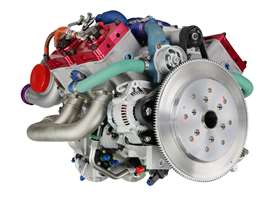DeltaHawk hydrogen engine goes beyond aviation
17 November 2023
Racine, Wis.-based DeltaHawk Engines, builders of a FAA-certified jet-fueled piston engine for general aviation aircraft, has completed advanced simulation analysis of a new hydrogen-fueled internal combustion engine (ICE) variant that the company said demonstrates the engine architecture is suitable for hydrogen fuel. It added that the compact, lightweight and durable engine will have applications in a variety of markets beyond aviation, including zero-emission vehicles (ZEV), other commercial power applications and multiple defense platforms.
 Variants of DeltaHawk’s FAA-certified piston-engine for general aviation aircraft are being developed for use in aviation, commercial vehicles and military mobility applications. (Photo: Business Wire)
Variants of DeltaHawk’s FAA-certified piston-engine for general aviation aircraft are being developed for use in aviation, commercial vehicles and military mobility applications. (Photo: Business Wire)
According to DeltaHawk, other advantages of its hydrogen ICE design include reduced development costs and time to market, higher durability and cost effectiveness due to its more mature technology and a reduced power degradation curve over time compared to current fuel cell technology. Combined, it said these attributes will enable a more rapid adoption of hydrogen power worldwide – especially with recent global government incentives for hydrogen in commercial trucking and delivery vehicle infrastructure and in military mobility applications.
DeltaHawk plans to leverage its aviation engine architecture, which is based on patented two-stroke technology, to create new variants of its engine family that will use hydrogen fuel in additional applications. The current DHK180A4 FAA-certified piston-engine has a 3.3 L displacement, bore x stroke dimensions of 4 in. by 4 in. and generates 180 hp and 363 ft.-lb. of torque at 2,600 rpm.
“In the general aviation industry, our family of engines are creating a highly reduced net carbon footprint coupled with airborne lead removal, thanks in large part to their fuel efficiency and capability to burn next-generation sustainable aviation fuels (SAF),” said Christopher Ruud, CEO of DeltaHawk. “Now, with our planned ability to expand our engine family to include variants that will utilize hydrogen fuel in aviation, commercial and military applications, we’ve taken another major step toward environmental sustainability, climate neutrality and a zero-emissions future.”
STAY CONNECTED




Receive the information you need when you need it through our world-leading magazines, newsletters and daily briefings.
POWER SOURCING GUIDE
The trusted reference and buyer’s guide for 83 years
The original “desktop search engine,” guiding nearly 10,000 users in more than 90 countries it is the primary reference for specifications and details on all the components that go into engine systems.
Visit Now
CONNECT WITH THE TEAM










